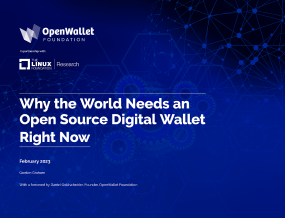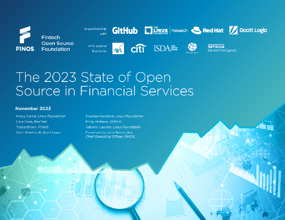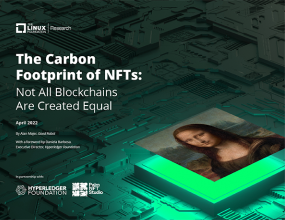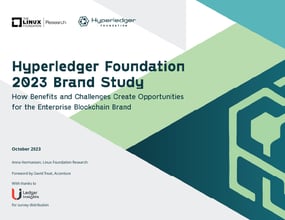What is Linux Foundation Digital Trust?
Linux Foundation Digital Trust is where open source projects, open standards, and decentralized applications converge. It is an information hub for LF-hosted projects and communities that develop standards, tools, governance, and infrastructure in support of digital assets, credentials, relationships, and ecosystems for use by people, governments, enterprises, non-profits, academic institutions, and society at large.
Here, you will find the project communities that each play a unique role in the digital asset ecosystem, with links to learn more about project governance frameworks, leadership teams, technical oversight committees, and, importantly, how you can get involved to support project sustainability.
What is “digital trust”?
Digital trust refers to the existence of open standards for trusted technologies that issue, store, and exchange a wide variety of digital assets in a trusted computing environment so that stakeholders have a high degree of confidence in their functionality. Digital trust projects enable us to solve challenges specific to the online digital world, making participation, relationships, and transactions more secure, private, persistent, and portable.
What problems does digital trust solve?
Trusted, standardized, digital technologies enable greater levels of confidentiality and interoperability, lower latency, and reduced friction in digital commerce and digital asset ecosystems. Through open source governance and development models, based on open standards, trusted technologies drive greater levels of interconnectivity, access, and innovation on a global scale.
Interoperability within and across communities and technologies is imperative - and we believe the fastest pathway to interoperability is through collaboration on open source and open standards. The Linux Foundation has been at the forefront of bringing people and organizations together to work in the open to solve complex issues, and Digital Trust is no exception. As multiple projects work on various pieces of the puzzle, LF Digital Trust identifies and connects distinct project communities to enhance collaboration, to help organizations and new contributors alike to find the projects that best meet their needs, and bring communities together to improve how the individual pieces of the interoperability puzzle can come together more concretely.
Which communities within the Linux Foundation are helping to solve the digital trust problem?
Which industry-focused projects at the Linux Foundation are at the forefront of digital trust implementation?
AgStack Foundation
Enabling the community consensus and implementation of trusted, vendor-neutral, and secure identity information for human, machine, animal, and geographic assets for the global food and agriculture industry. AgStack supports open collaboration to continuously evolve these standards and services.
Featured Research
“Having standardization of geo-boundaries through AgStack's asset registry can reduce or eliminate friction associated with deforestation tracking for agriculture commodities as increasingly required by E.U. regulators.”
- LARS KAHNERT, GIZ.DE, GERMAN MINISTRY FOR INTERNATIONAL COOPERATION“Using AgStack’s asset-registry, a universal indexing and identity can be ascertained for a geographic field boundary anywhere in the world. This can unlock and make interoperable hundreds of different datasets at CGIAR which exist at different resolutions and projections.”
- BRIAN KING, DIRECTOR OF INNOVATION ACCELERATION, CGIAR“As our global economy and societal infrastructure increasingly rely on digital interactions, the evolution of digital trust has not kept pace with the rapid digitization. This is evident with AI's recent astronomical rise. It's crucial, now more than ever, to build digital trust technologies that are interoperable, secure, and protect the privacy of individuals. Spruce is honored to support the Linux Foundation's projects, such as the Decentralized Identity Foundation (DIF), in creating the foundational elements that increase trust and security in digital interactions.”
- WAYNE CHANG, CO-FOUNDER AND CEO OF SPRUCE“From the early days of the Internet, through the development of the web, smartphones, and social media, our traditional trust frameworks and their supporting computational infrastructures have been pushed to their limits. We're facing a huge challenge to innovate and update our digital trust foundation, making it not only more secure and scalable but also fairer, more private, and accessible to benefit everyone around the world. With the arrival of ChatGPT and other powerful AI that's quickly blurring the line between creation and reality, our task is urgent and worldwide. That's why it's important for us to support and contribute to digital trust projects like these in the Linux Foundation and in other communities.”
- WENJING CHU, SENIOR DIRECTOR OF TECHNOLOGY STRATEGY AT FUTUREWEI“Governments help establish a foundation of trust for the economy. Providing citizens and businesses with trustworthy identity documents, registration of legal entities, and regulated services that support an orderly and lawful economy is our “core business”. It’s now time to upgrade our capabilities to match the needs of the digital economy. Uploading pictures of drivers licenses cannot be the approach. Instead, the Digital Trust projects of the Linux Foundation are laying a technical and governance foundation that supports people and businesses having safe, trustworthy experiences online.”
- JOHN JORDAN, EXECUTIVE DIRECTOR, PROVINCE OF BRITISH COLUMBIA DIGITAL TRUST SERVICES“Trust on the Internet is at an all-time low because the average Internet user is overwhelmed with trust decisions they are not equipped to make. Even security professionals are fooled by some of the most sophisticated attacks today — and that’s even before we have AI-powered attacks. The answer is to build real sustainable digital trust infrastructure — the digital equivalent of the tools we use every day to establish and maintain trust in the real world, like wallets and credentials and audit trails and governance agreements. This is what the LF Digital Trust family of projects are building.”
- DRUMMOND REED, DIRECTOR OF TRUST SERVICES, GEN; TOIP STEERING COMMITTEE MEMBER; OWF BOARD MEMBER“There is a driving need for both digital trust and open source technologies and processes if we are to fulfill a true transformation of how we operate on the Internet. Schellman is proud to be part of the governance and accountability processes of digital trust. We need the Linux Foundation to continue to be a beacon of light for governments and organizations that need to leverage thought leaders who are creating products, tools and services they can use in this emerging space.””
- SCOTT PERRY, PRINCIPAL, CRYPTO AND DIGITAL TRUST SERVICES, SCHELLMAN“The Decentralized Identity Foundation and now this Digital Trust Initiative from the Linux Foundation are highly relevant to Polygon ID. Our team members are currently engaged in various of the working groups including the claims and credentials (with special focus on Zero Knowledge integration), wallet and data backup standards initiatives. The DIF provides a great forum for us at Polygon ID to interact with the industry, get feedback, and work on setting privacy preserving identity standards that we need to bring SSI to Web3.”
- SEBASTIAN RODRIGUEZ, VP OF PRODUCT, POLYGON ID“Since ancient Rome, human society has been held together by trust and cooperation: merchants, banks, and democratic institutions have built their trustworthiness in time. As we live in an evolving digital society, we must be able to trust the devices, information, and people we interact with without knowing or seeing them. This level of trust cannot be achieved by governments or private organizations alone; therefore, collaboration is paramount, and Linux Foundation is the common ground we all can meet and build.”
- VIKY MANAILA, TRUST SERVICES DIRECTOR, INTESI GROUP“The power of our digital world to transform our lives has accelerated massively. It is imperative that we establish common foundations that align to our respective community values. Open source and good standards and policies are crucial and we need to build them together. The ability for Linux Foundation Digital Trust projects to convene, coalesce, and champion the responsible way forward is deeply valuable. Accenture is proud to help support and lead this effort.”
- DAVID TREAT, SENIOR MANAGING DIRECTOR AT ACCENTURE, CO-LEAD OF ACCENTURE’S METAVERSE CONTINUUM BUSINESS GROUP, HYPERLEDGER FOUNDATION GOVERNING BOARD CHAIR, OPENWALLET FOUNDATION BOARD MEMBER“Identity management has to be simplified and, above all, entirely protected. We believe that centralized systems to federate identities will be replaced by decentralized systems where individuals can self-govern their identity and verified credentials via the usage of digital wallets. Projects such as the Digital Trust initiative driven by the Linux Foundation are incredibly important, and supported by Symphony, as we seek to contribute to the overall simplification of identity and credential management.”
- DIETMAR FAUSER, CIO, SYMPHONY; IDENTITY FOR FDC3 - DECENTRALIZED IDENTITIES BOARD MEMBER“With each deployment of verifiable credentials built on open source and open standards, the missing verification layer for digital interaction on the internet is being built. The ability to identify people and things and authenticate their data will address the staggering and unsustainable cost of fraud and the damage that does to trust and privacy in digital interactions. Many of the technologies and projects at the Linux Foundation focused on identity are laying the foundation for digital transformation and for the trust that is necessary to support people, businesses, and customers all over the world.”
- HEATHER DAHL, CHIEF EXECUTIVE OFFICER, INDICIO; HYPERLEDGER GOVERNING BOARD MEMBER





